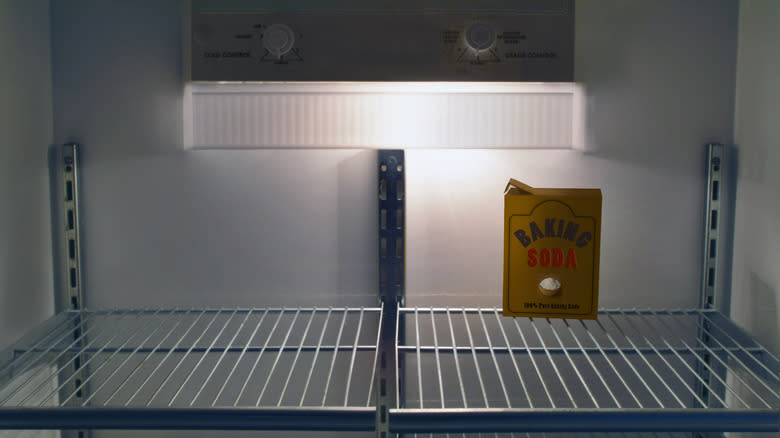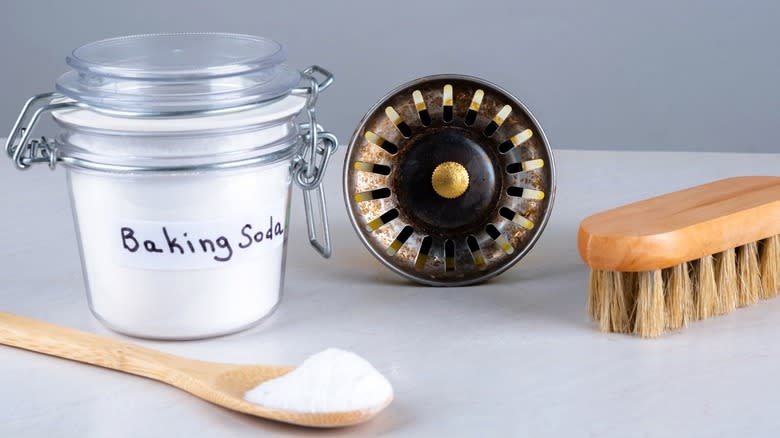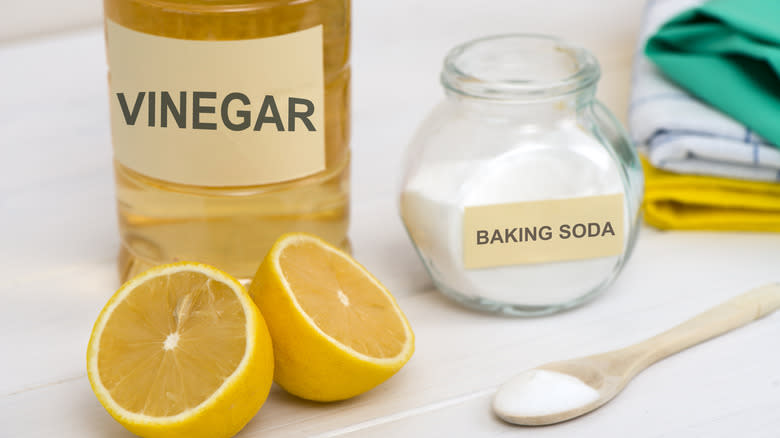Can You Use The Open Baking Soda From Your Fridge In Baking?

We may receive a commission on purchases made from links.
Baking soda is a pantry staple. It's employed in a host of ways, but is typically used for cleaning, and most often appears as a key ingredient in baking. If it isn't currently sitting in the cupboard, a box of baking soda is likely to be found in the back of the refrigerator with its cardboard box tongue sticking out, absorbing all the funky smells floating around the icebox. If you've ever been baking a batch of cookies and found yourself without this leavening agent to hand, the thought may have crossed your mind to simply nip a little from the odor-eating bicarbonate in the fridge. Don't do this, unless you want fishy cheese-flavored cookies.
Even if you keep a pretty clean refrigerator, baking soda has a pretty short shelf life. Once a box has been opened, you'll want to use or discard it after roughly six months. This is actually when you should throw it in the fridge. Though out-of-date baking soda might not be of any use in your baked goods, it'll still soak up all the weirdness of leftovers in the fridge. But seriously: once baking soda has been sitting in the fridge, it should stay there -- because it will corrupt muffins, cakes, and breads alike.
Read more: The 18 Unhealthiest Store-Bought Sliced Breads You Can Buy
What Is Baking Soda?

Baking soda (the common name for sodium bicarbonate) is an alkaline -- which allows it to neutralize acid, much like the ones that create nasty smells in the refrigerator. Conversely, baking soda can help when you get acid reflux by changing the pH of your stomach acid. When mixed with a liquid as well as an acid (or a combination of both, like vinegar), baking soda produces carbon dioxide, making it equally effective in leavening baking dough as it is in creating science fair volcanoes.
What happens to baking soda as it gets old is that its ability to create and release carbon dioxide, once activated, diminishes. Unopened baking soda will last up to 18 months, but as soon as it's exposed to the air it will degrade pretty rapidly. If you find that your baking soda is off and you need a leavening agent, you can substitute baking powder for baking soda in a bind. It's important to know that baking soda is a stronger leavening agent than baking powder, so you'll need about three times more baking powder than baking soda called for in your recipe. Oh, and it may also affect the flavor of your bake. It's important to keep track of the age of your baking soda to avoid these kinds of mishaps.
What To Do With Old Bicarbonate

If you didn't write a date on your box of baking soda when you opened it, it's not the end of the world. There's a simple trick to test the fizziness of your bicarbonate: Scoop a small amount of baking soda into a dish and pour a few drops of acid (like vinegar or lemon juice) on it. If the bicarbonate starts to fizz, it's still got some leavening power. If nothing happens, you know that your soda's gone flat and it's time to get a new box.
If the idea of throwing out baking soda frequently makes you shudder, there are some ways you can use bicarb that's no longer bake-worthy. If your soda is less than a year old, this is the perfect time to put it in the fridge to eat up bad smells and reduce stink for the following six months. Old baking soda is a great appliance cleaner when made into a paste. Just add a little water -- enough to make it pasty -- and use that to clean your oven. When you're finished, simply sponge off the remaining paste. But whatever you do, don't bake with the old stuff, unless spoiled milk-flavored muffins are your thing.
Read the original article on Daily Meal.

